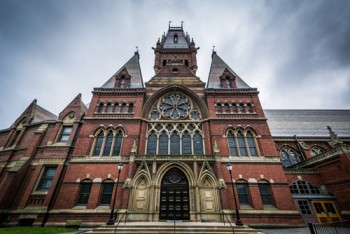US urges public disclosure of Harvard documents in group's suit alleging admissions bias

Harvard’s Memorial Hall/Shutterstock.com.
The U.S. Justice Department is urging a federal judge in Boston to allow public release of documents in a student group’s suit claiming bias against Asian-Americans in the admissions process.
The DOJ recommended that U.S. District Judge Allison Burroughs not keep the admissions data under seal, report CNN, the National Law Journal, Reuters and Politico. How Appealing links to additional coverage.
“The public funds Harvard at a cost of millions of dollars each year, and thus has a paramount interest in any proof of these allegations, Harvard’s responses to them, and the court’s resolution of this dispute,” the Justice Department wrote.
The Justice Department’s “notice of interest” cites its own investigation into bias in Harvard admissions. The government said it may file a “statement of interest” in the student group’s case, and the documents are needed as it decides whether to file a brief.
DOJ is investigating whether Harvard’s admissions policies violate Title VI of the Civil Rights Act, which bans discrimination in programs receiving federal funding. In Friday’s legal filing, the Justice Department said it has secured most of the documents disclosed in discovery in its own investigation of the case.
The group that filed the suit is Students for Fair Admissions. It said in a letter to the court filed the last week of March that the documents it obtained are so compelling that the judge can decide the case on summary judgment, the New York Times recently reported.
Harvard has argued that, if the case is decided at the summary judgment stage, the only evidence that should be disclosed is that needed to make a decision. The university told the court that admissions information would be of great interest to college admissions consultants seeking an advantage in the competitive admissions process, and “would put Harvard at a severe competitive disadvantage.”
Harvard said in a statement that it “is responsible for protecting the confidential and highly sensitive personal information that prospective students—none of whom asked to be involved in this dispute—entrust to us every year in their applications. We are committed to safeguarding their privacy while also ensuring that the public has the access that it is entitled to under the law.”
Harvard told the Times last week that it does not discriminate against applicants from any group in its admissions process.
“We will continue to vigorously defend the right of Harvard, and other universities, to seek the educational benefits that come from a class that is diverse on multiple dimensions,” the university said.



